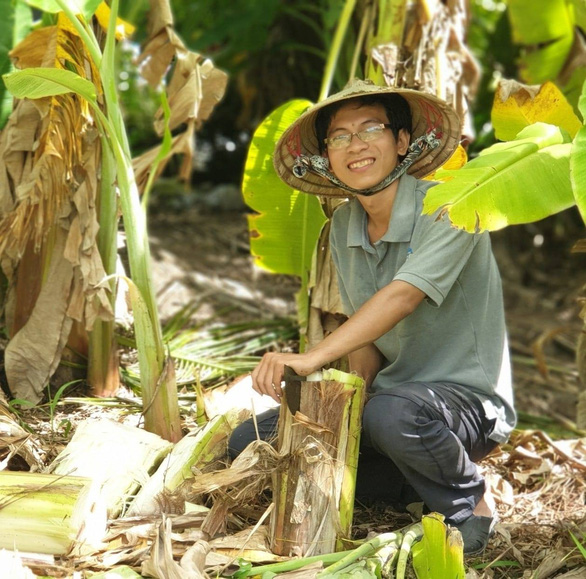Vo Quoc Lap has pushed himself hard in adopting forest gardening, a low-maintenance, sustainable, plant-based food production and agroforestry system based on woodland ecosystems, in the Mekong Delta province of Kien Giang.
Lap’s project, Tre Mo, is a 10,000-square-meter forest garden snuggled in U Minh Thuong District, Kien Giang Province.
The project, getting its name from bamboo, a sustainable and versatile resource which also represents the pastoral life in Vietnam, grows fruit trees, vegetables, and medicinal herbs using pesticide-free cultivation techniques.
Launched by 27-year-old Lap and his friends, Tre Mo is among the three that have received a grant from a program called Rut Ngan Khoang Cach (Narrow The Gap) 2020, an initiative developed by the LIN Center for Community Development (LIN).
LIN is a Vietnamese, non-governmental and not-for-profit organization operating under the Vietnam Union of Science and Technology Associations.
Rut Ngan Khoang Cach provides support for grassroots community development projects in southern Vietnamese cities and provinces, with the selected projects to be implemented within one year, according to Nguyen Thi Ngan Khanh, LIN’s PR and marketing manager.
Evergreen, sustainable forest gardens
Lap pins his hopes on the potential of forest gardens, a designed agronomic system based on trees, shrubs, and perennial plants which are mixed to mimic the structure of a natural forest.
Originally from Dong Thap Province in the Mekong Delta, the man has given his all to designing and running thriving forest gardens in a few localities while trying to improve local farmers’ awareness of clean and sustainable farming.
He is currently providing consulting for and designing one of such forest gardens in Cam My District, located in Dong Nai Province, neighboring Ho Chi Minh City.
He came a long way in getting his green model ready and going.
Passionate about clean agriculture for as long as he can remember, Lap began to germinate an idea to spread seeds of forest gardening, which was new to many local farmers.
That followed his field trips to forests in Mekong Delta localities, including Can Tho, An Giang, Hau Giang, Kien Giang, and Dong Thap, his hometown, as well as those in northern and central Vietnam.
It was during these trips that he came to sympathize with farmers, who had no choice but to keep abusing chemical fertilizers and pesticides for eye-catching produce despite being well aware of the health hazards posed to themselves and consumers.
Lap decided to act promptly before it got too late, concerned about how unstable local farmers’ livelihood is as they are dogged by chronic problems including aggravating salinity and climate change which have taken a heavy toll in recent years. Plus the novel coronavirus (COVID-19) pandemic has caused unprecedented uncertainty.
Forest gardening then came naturally to him as an alternative, which replicates layers of wild plants of the woodland on a miniature scale with fruits, herbs, vegetables, and other high-yielding plants grown with pesticide-free farming techniques.
The model also diversifies produce, improves productivity and income, and reduces the risk of poor crops while helping restore the ecosystem and enhance adaptability to climate change.
Lap shared he went through many challenges in turning his idea into a reality.
Despite efforts to promote forest gardening and clean agricultural methods, which are key to sustaining livelihoods and mitigating the impacts of many ongoing environmental problems, the man failed to get his message across.
Believing that without any practical act there would be no convincing messages sent to the community, Lap embarked on the Tre Mo project and invited some of his like-minded friends on board.
The project’s results are recorded and become entries in training manuals, he said.
The forest garden, built under the Tre Mo project, has drawn 20 students and volunteers who come to pick up and practice clean agriculture techniques.
Some 150 participants, including local farmers and those from other localities are armed with environment-friendly farming procedures which help cut costs and mitigate disastrous environmental impacts.
At least 100 native plants are conserved thanks to the passion of the project founders and volunteers.
For a greener planet
As a pharmaceutical chemistry student at a university in Can Tho City, Lap formed a group called Vuon thuoc Nam (Vietnamese Medicinal Plant Garden) and put forest gardening to the test on an unoccupied plot on the school campus.
Impressed with his garden, which thrived despite no chemical fertilizers or pesticides, a pharmaceutical company employing European procedures to develop clean medicine offered him a managerial job upon his graduation.
The then-new graduate was trusted with overseeing a medicinal plant farm. This was when the love for clean farming began to bud in his heart.
Lap wrote many articles to share his knowledge and expertise on the sustainable farming practice with farmers while providing free professional advice and designs of forest gardens.
The engineer shared his deeds are aimed at helping build a green planet, stressing planting trees refines human beings’ quality, as stated in his favorite maxim by Masanobu Fukuoka, a Japanese farmer and philosopher celebrated for his natural farming and re-vegetation of decertified lands: ‘The ultimate goal of farming is not the growing of crops, but the cultivation and perfection of human beings.’
Like us on Facebook or follow us on Twitter to get the latest news about Vietnam!


















































